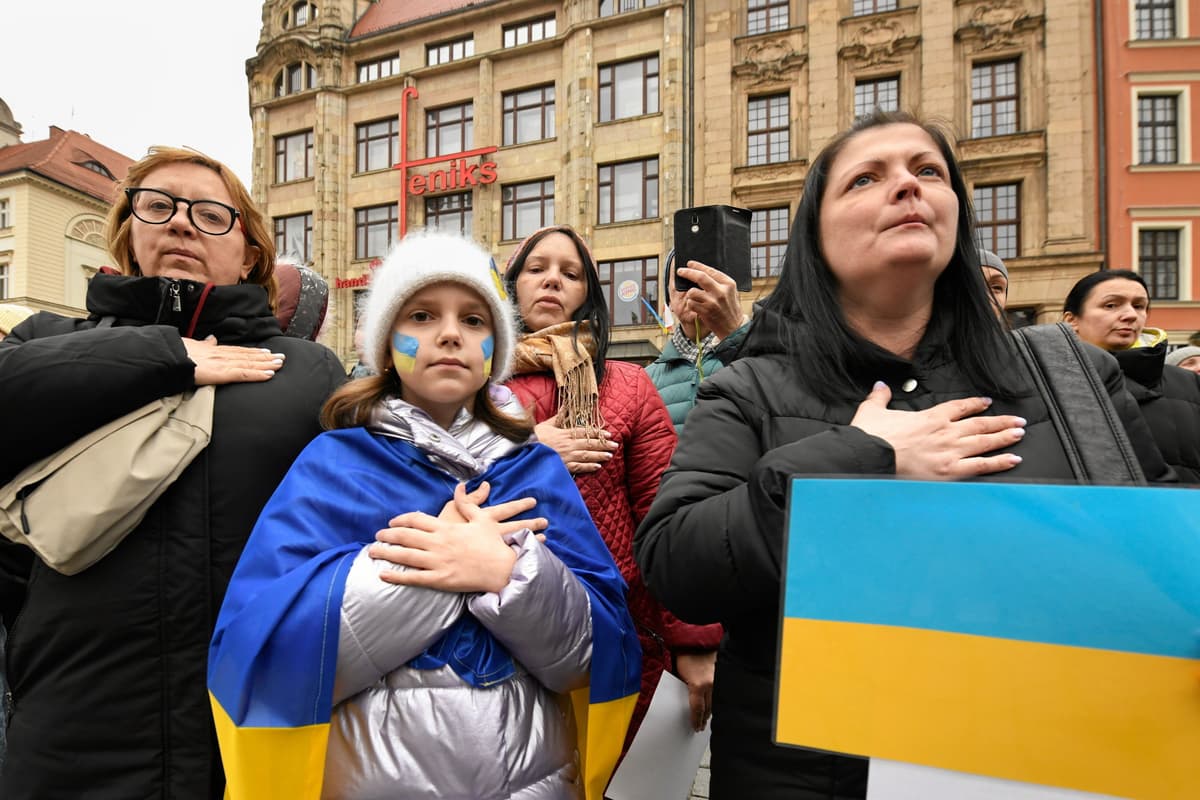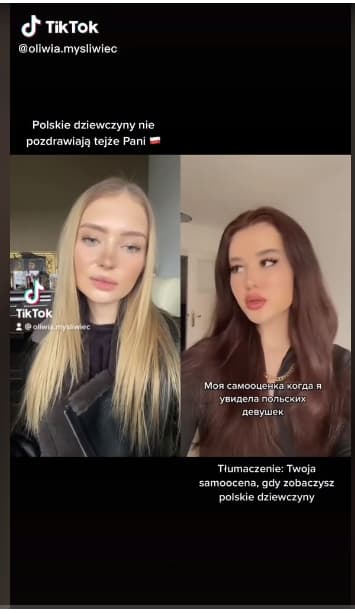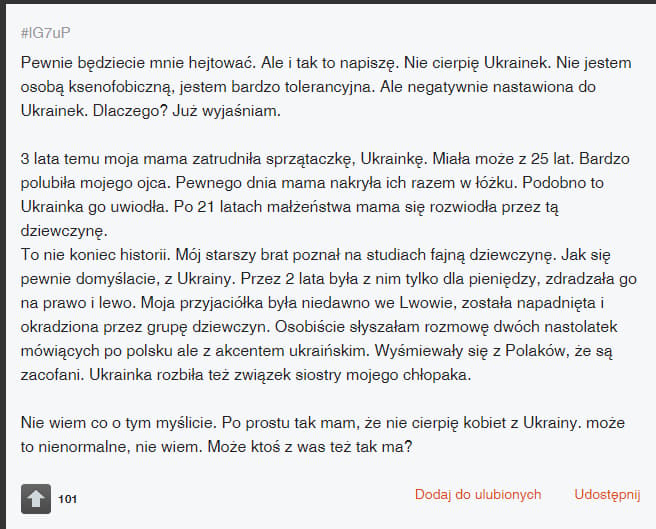Shaktiman
Major
★
- Joined
- May 24, 2022
- Posts
- 2,080

A Ukrainian woman stole her husband? Young Polish women are victims of disinformation
Polish women were the targets of a disinformation campaign in the spring, which was designed to discourage them from helping female refugees from Ukraine. Young women’s worst fears were deliberately exploited. We are probably seeing the effects of this right now
A Ukrainian woman stole her husband? Young Polish women are victims of disinformation
Polish women were the targets of a disinformation campaign in the spring, which was designed to discourage them from helping female refugees from Ukraine. Young women’s worst fears were deliberately exploited. We are probably seeing the effects of this right nowWydrukuj
Skomentuj
Tylko 1 na 300 czytających ten artykuł wspiera OKO finansowo. Wyobraź sobie co moglibyśmy osiągnąć, gdyby było nas 10 x więcej...
30 zł50 zł75 zł100 złInna
Wspieram
lubdowiedz się więcej >>
Angielska wersja tekstu „Ukrainka ukradła męża? Młode Polki ofiarami dezinformacji – dziś widać skutki”, który ukazał się w OKO.press 26 listopada 2022 roku.
Public opinion polls today show a higher level of negative attitudes among Polish women than among Polish men with respect to the long stay of Ukrainian men and women in our country. This surprising (in the context of other surveys) difference may be a result of the spring disinformation campaign. Although we do not have any hard evidence of who conducted it, a great deal suggests that it was a part of a Russian cyber war.
The majority of Poles have a clearly positive attitude towards Ukrainians residing in Poland. Likewise, most believe it would be good for our country if people from Ukraine were to stay with us for a long time. This is presented in a November poll by Ipsos for OKO.press.
Men slightly more positive
However, a certain surprising difference in the responses of women and men aged 18-39 is noticeable in it. Surprising, because, since the start of the war, it is precisely women who have been more frequently involved in directly helping refugees.And yet, today, 64% of them have a positive opinion of the long-term stay of Ukrainians in Poland, while 35% express a negative opinion. This is significant because only 23% of men of the same age (18-39) have a negative attitude, which is 12 percentage points fewer than women. Meanwhile, 71% assess such a possibility as being positive.
This difference between the genders already appeared in the September Ipsos poll.
‘Men slightly more positive,’ wrote Julia Theus in OKO.press at that time. ‘Almost the same number of the youngest women (18–39 years) as middle-aged women (40–59) and women aged over 60 (59–62%) positively assess the long-term presence of Ukrainian women and men. There are also no generational differences among men, but there are slightly more positive responses (67–71%).
Perhaps men look at women more favourably?’
It appears that economic issues are the most important factor affecting attitudes towards Ukrainians. This is because other demographic data shows that people with primary and lower secondary school education, as well as people with no income, as well as farmers and labourers, most fear the vision of refugees remaining in Poland. It is important, however, that the aversion in each of these groups is declining over time. We are, therefore, probably becoming accustomed to the situation. This is slowly becoming the norm and is resulting in less of a feeling of insecurity.
Artificially generated narrative
However, the difference among male and female respondents aged 18–39 is noticeable. It has even sparked a discussion on Twitter. It was initiated by Marcin Kędzierski of the Jagiellonian Club.He stated that ‘young Polish women are upset with Ukrainian women because these women have a different career model. In Ukraine, a woman’s social advancement, still more frequently than in our country, arises from a relationship, rather than independence. That is why Ukrainian women look after themselves so much, which can give rise to irritation (‘Ukrainian women are lazy’) and jealousy (‘they want to snatch our partners from us’).
Criticized for this statement, he later explained that he noticed a social attitude ‘in which young Polish women look at young Ukrainian women as competitors not only economicall, but also in the “matrimonial” sphere,’ which he believes can explain the perceived reluctance.
This sounds as if Marcin Kędzierski has succumbed to a falsified narrative trend, the popularity of which peaked in Poland in the the spring. Simply put, it was based on the assertion that Ukrainian women look after themselves better than Polish women, or in other words, they are prettier. And because of this, they pose a threat to young Polish women looking for partners.
But this was not a natural narrative.
A great deal suggests that this was artificially generated by Russian propaganda. Advantage was taken of the fears of women, which are not related either to refugee women or to citizens of any other country, for this purpose.
Trend on TikTok
At the beginning of April, a young Ukrainian woman, who runs the @.mommyjuicy account on TikTok, made a video that she posted on this platform. In it, she boasted that her self-esteem had skyrocketed after seeing what young Polish women looked like.Her video sparked so many reactions that we had a new trend on TikTok for some time. Girls from Poland criticized @.mommyjuicy and started to prove that they looked better than her. In turn, Russian-speaking users (claiming to be Ukrainian) followed in @.mommyjuicy’s footsteps and also attacked Polish women.

tiktok
An analysis of the @.mommyjuicy account shows that she is probably indeed Ukrainian. However, she had already come to Poland in the spring of 2021, which was therefore unrelated to the outbreak of the war. Meanwhile, in the summer of 2022, she left for Turkey, where she is currently staying. She deleted her video and, today, it can only be seen as material used by people responding to her message.
It does not appear that the young woman’s recording was in any way inspired by Russian propaganda. However, simply bucking the trend by posting responses from Russian-speaking TikTok users was part of a propaganda campaign which was then visible on numerous social media platforms.
The objective: to discourage women from helping
In the early spring, (mostly) anonymous posts appeared on various news channels, with which attempts were made to discourage Polish women from Ukrainian women. Even then, the polls showed that women more frequently involve themselves in helping refugees. In a survey for OKO.press conducted in March, Ipsos showed that as many as 75% of respondents from the group of women aged 18–39 had personally helped, compared with 56% of men in the same age group.It was probably precisely at this point that it became clear to the Russian decision-makers pursuing information warfare that they needed to discourage young Polish women in order to weaken the wave of aid in Poland. We do not have any strong evidence that the Russians were behind specific posts and messages. However, both the context and the methods used lead us to suspect that they launched an attack on young women.
Even in March, Russian propaganda was threatening that refugees from Ukraine were dangerous because they attack defenceless people and steal. As this wave of the narrative subsided, another wave appeared, which was targeted specifically at women.
Fake stories
On 27 March, Magda Szpecht, a member of the Cyber Elves movement battling against Russian disinformation, stated in OKO.press:„Around 10,000 fake accounts have now appeared with the intention of discouraging Poles from helping Ukrainians. (...) There are even trolls in women’s groups dedicated, for example, to wedding preparations. A variant of the story of a Polish woman who took in a Ukrainian woman, who slept with her husband, appears in such groups. The Polish woman says she threw her husband out of the house, but the Ukrainian woman stayed with her. Now, she doesn’t know what to do about all that, but she doesn’t want the Ukrainian woman to take her place,’ wrote Szpecht. ‘This is a fake story. The posts are designed to give the illusion of credibility; there are typographical errors in them and a great deal of psychologically believable emotions”.
Such posts have appeared, if only on the anonimowe.pl portal, which is a kind of internet forum. The entries do not have dates, so it is difficult to place them exactly in time, but the content is highly characteristic:
"I hate Ukrainian women. I am not a xenophobic person, I am very tolerant. But I have a negative attitude to Ukrainian women. Three years ago, my mother employed a cleaner, a Ukrainian woman. She was around 25 years old. She very much liked my father. One day my mother caught them in bed together. Apparently it was the Ukrainian woman who seduced him. After 21 years of marriage, my mother got divorced because of this girl,’ reads a post from one of the anonymous accounts.
You will porbably hate me. But I will still write this. I hate Ukrainian women. I am not a xenophobic person, I am very tolerant. But I have a negative attitude to Ukrainian women. Why? I shall explain.
Three years ago, my mother employed a cleaner, a Ukrainian woman. She was around 25 years old. She very much liked my father. One day my mother caught them in bed together. Apparently it was the Ukrainian woman who seduced him. After 21 years of marriage, my mother got divorced because of this girl.
This is not the end of the story. My older brother met a cool girl at university. As you can probably imagine, from Ukraine. She was with him for 2 years only for money, cheating on him with just about everyone. My girlfriend was recently in Lviv; she was attacked and robbed by a group of girls. I personally heard a conversation of two teenagers speaking Polish, but with a Ukrainian accent. They were making fun of the Poles, that they are retarded. A Ukrainian woman also broke up a relationship of my boyfriend’s sister.
I don’t know what you think of this. This is simply me; I hate women from Ukraine; perhaps this is abnormal, I don’t know. Perhaps any of you feels the same way?"

anonimowe
Anonymous, but also universal
A thread warning Poles also appeared in the same post („My older brother met a cool girl at university. As you can probably imagine, from Ukraine. She was with him for 2 years only for money, cheating on him with just about everyone”), but this is the exception.Stories about the negative influence of Ukrainian women on everyday life were more frequent: that they occupy places in the queues to the doctor and the hairdresser, they are noisy, smoke cigarettes at bus stops and do not understand Polish. Additionally, teachers focus their attention on Ukrainian pupils instead of Polish children; in discos all the seats are taken by refugees while Ukrainian parents beat their children in public.
All these stories were completely anonymous. They did not contain any information enabling the identification of the place or time or the protagonists of the event. They were therefore factually completely unreliable, but, on the other hand, they were absolutely universal. They could have happened anywhere – and nowhere.

While they were probably mostly untrue, they could theoretically have happened to anyone.
Weed stories
Professor Przemysław Sadura, co-author of a recently published sociological study entitled ‘Poles for Ukraine, but against Ukrainians’, calls such stories „weed stories”.„They take advantage of the mechanism of gossip and spread through the social media. (...) It cannot be ruled out that they are true, but I seriously doubt it. We have counted a dozen or so such schematic stories that look a bit like they have been written according to the same pattern”, said Sadura in Agata Kowalska’s podcast in OKO.press.
Weed stories are read in the social media, but repeated as their own, without any information on the online source. Therefore, the hairdresser from the story becomes „our hairdresser” and the unspecified woman becomes „my friend”.
„There is a combination of disinformation in the internet with the mechanism of gossip”, wrote Sadura. „This activates a personal anxiety related to whether my situation and my wellbeing are at risk”.
An incident that took place on 27 March in Stanisław Dolny proves that the weed stories extend far beyond the internet. At a mass in the parish of Stanisław the Martyr, Reverend Jacek from the Benedictine order in Tyniec warned parishioners while preaching a sermon about the consequences of taking in refugees.
Among other things, the clergyman said: ‘Polish women should be wary of Ukrainian women who have come to Poland, because these women will immediately start to seduce and take their husbands away from them.’
Polish man seeks Ukrainian woman
However, the Facebook group „Polak szuka żony Ukrainki” [Polish man seeks Ukrainian wife] became famous in May. It had existed since 2020, but it started to grow rapidly in April 2022. It had grown to 17,000 members in May.Some were probably genuine Facebook users, but interest in ‘matrimonial offers’ was also fuelled by accounts of internet trolls. Ultimately, the group was blocked by FB for breaching the regulations.
While it was still operating, the editors of the Noizz website wrote about the types of comments that appeared there: ‘Heated discussions about Polish women resounded there. Opinions that they were “so lazy” and discussions about what made them “bad” according to the men there predominated. Likewise, with regard to beauty, Ukrainian women were said to be superior to Polish women. There were increasingly more troll provocations in the last weeks of the group’s activity. The posts mainly struck at Polish women in an attempt to ridicule them. “I would like to meet a Ukrainian woman because Polish women stink, don’t make an effort and don’t want to cook,” wrote one of them’.
Several posts were also quoted:
„One thing I am happy about is that the situation will change in Poland on the matrimonial market. Now, Polish women have a problem because there are about 1 million Ukrainian women are in our country and guys will have something to choose from, instead of princesses hahaa”,
„And on top of that, Ukrainian women are prettier, more hardworking and don’t have a stick up their a*ses”,
„So guys, get down to work with Ukrainian women, instead of the dirty Polish women who don’t wash”.
From the dictionary of Russian disinformation
It was also characteristic that, according to the opinions that were being repeated in the group, Polish women were supposed to be spoiled by the prosperity of the West, which had not yet reached Ukrainian women. And while the previous entries can be understood as simply the opinions of frustrated men, the latest narrative sounds like it has been taken out of the dictionary of Russian information warfare.It is precisely in accordance with Russian disinformation that the West is presented as a symbol of evil, destruction and moral corruption.
Today, there are similar groups on Facebook, but they are small, while the posts are mostly used to promote erotic dating apps. Meanwhile, accounts that present themselves as Ukrainian women are fake profiles with exotic-sounding names: Fauzi Abdillah Husseine, Nx U-sHe or Zia Amanda.
However, on Telegram, Russian propagandists drummed up interest in a real (albeit single) story from the UK. It was about a Ukrainian woman, Sofia Karkadym, who was taken in by Tony Garnett and his wife Lorna to their flat, as part of the UK’s „Homes for Ukraine” programme.
Sofia quickly got together with Tony. The couple posed for photographs, which they posted in the social media, and planned their wedding. However, the relationship ended after four months as spectacularly as it had started. Sofia refused to acknowledge the break-up and, as a result, was arrested twice outside Garnett’s house.
A British man could not bear to live with the Ukrainian refugee for whom he left his wife.
The footage shows the arrest of Ukrainian refugee Sofia Karkadym, who first destroyed the British man’s family and then broke into his flat after they broke up.
The lady went to the rented flat of her now ex-boyfriend, Tony Garnett, kicked in the door and started shouting. As she later told the Daily Mail –to the conversation. After the argument, several police officers tried to push the crazed blond into the case but she was unsuccessfully resisting and crying to Tony for help. This is the second detention of the Ukrainian women – she has now been prohibited from seeing her ex. If Sofia continues to breach this injunction, she will end up in the police station.
Just to recall, the 22-year-old Sofia Karkadym left Lviv for Poland. A British couple from Bradford, Tony Garnett and his wife Lorne, agreed to sponsor her. After 10 days, the blonde beauty stole the husband from the family – after 10 years of marriage. The British-Ukrainian Love Story has finally come to an end. Sophia Karkadym, who broke up the family that gave her refuge in Bradford, has returned to Ukraine.
The fugitive was, after all, escorted to the airport by her ex, Tony Garnett, who had earlier reported the girl to the police. Sofia told the Daily Mail that she was returning to Kyiv on a flight via Poland. After splitting up with Tony, she had no money left, her visa had been run out and she was living in a council flat.
The relationship between 30-year-old security guard, Tony Garnett, and 22-year-old Sofia Karkadym, a refugee from Ukraine, started about four months ago. The couple, with children from Bradford, took the girl into their home, but after 10 days Sofia stole the father of the family and the newly-weds started to live together in a rented flat. At first, all was well and they were thinking about getting married, but the affair became a burden and a cause of arguments. According to Tony, the girl drank a lot of strong beer and threw tantrums. Furthermore, she was arrested twice by the police.
Stoking up women’s anxieties
This story, which was negative exclusively for the Ukrainian woman, was repeatedly posted by Russian and pro-Russian Telegram channels. Even those that are operated in Polish. It is likely that the fate of the British couple was intended to serve as a warning to those women who wanted to take Ukrainian refugees in under their roof.Such individual events and weed stories work most strongly when they take advantage of the pre-existing fears of the audience. The stronger the emotions, the more we are inclined to identify with the protagonists of such stories.
So let’s take a look at what Polish women are afraid of most. According to Gedeon Richter’s 2021 report entitled ‘Polish women of 2021. New values for new times’, they are most afraid of loneliness (32% of female respondents).
Meanwhile, according to the Spis Kobiet [Women’s Census] survey conducted for WIMIN and the Dajemy Dzieciom Siłę [Give Children Strength] Foundation in June 2022 (questionnaires; 1,600 responses), one of the greatest problems of Polish women is their appearance.
As researchers Anna Buchner and Maria Wierzbicka-Tarkowska reported, „three out of four women harshly assess and are dissatisfied with their appearance. For three out of these four, appearance is (...) the most problematic issue”.
The actions discouraging them to Ukrainian women described earlier were exactly in line with these concerns of Polish women. A TikToker ridiculed the appearance of young women. Meanwhile, the posts about marital infidelities and the opinions of the troll accounts that it is better to choose Ukrainian women as wives incited the fear of loneliness.
But it is still Russia that we are scared of the most
The effects of such an influence could be much stronger if not for the fact that the greatest fear of Poles, for both sexes, is Russia. And not just now, during the war. In a survey conducted in 2019 by Pew Research Center, as many as 65% of Poles specified Russia in their responses as to what they fear most.
However, for a small percentage of female respondents surveyed by Ipsos, personal fears, fuelled by the online campaign, may have dominated their moods. Combined with economic and social concerns, they have probably meant that young women in Poland today have a more sceptical attitude to the long-term stay of Ukrainian refugees than young men.







